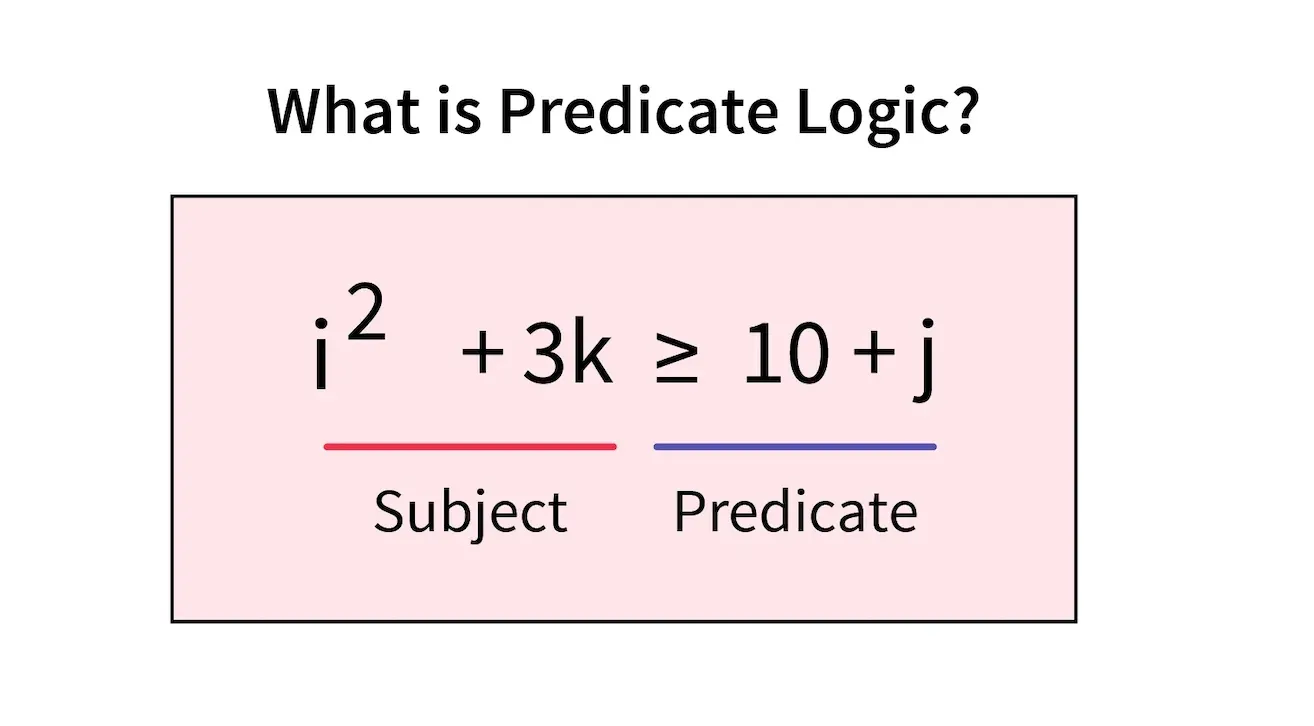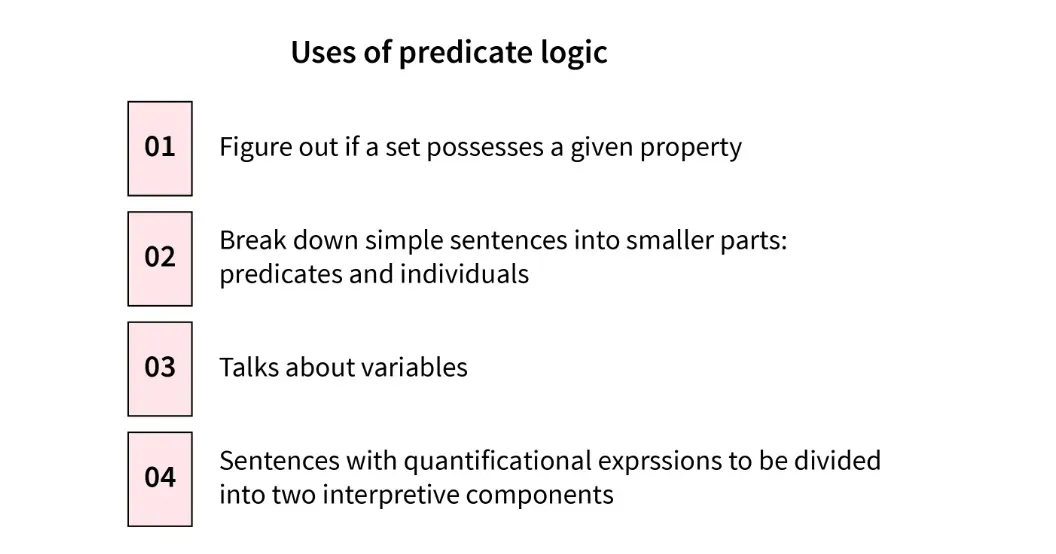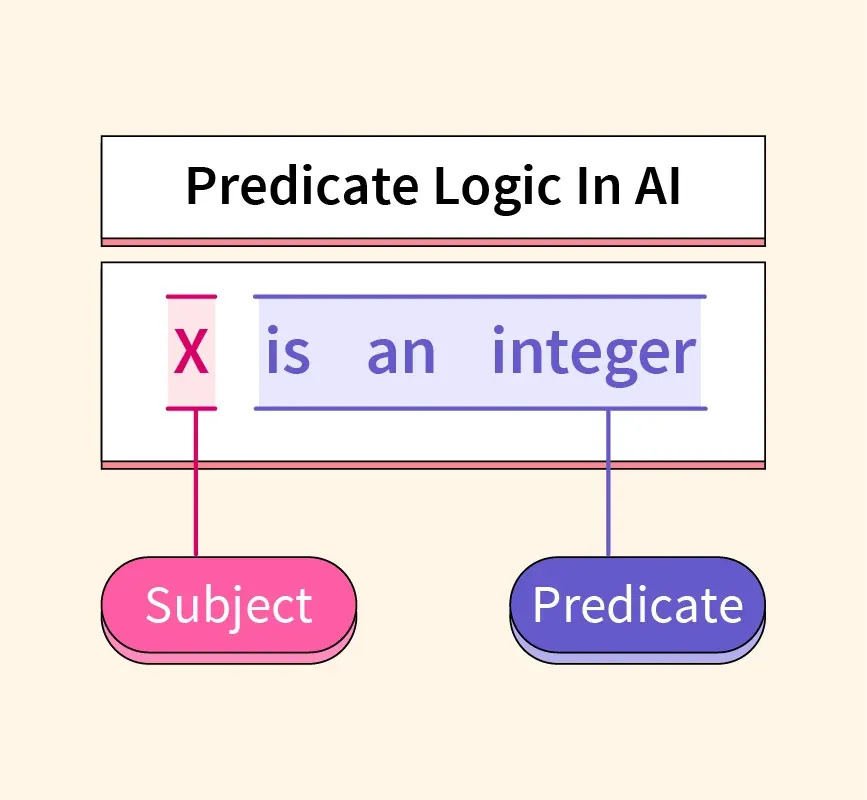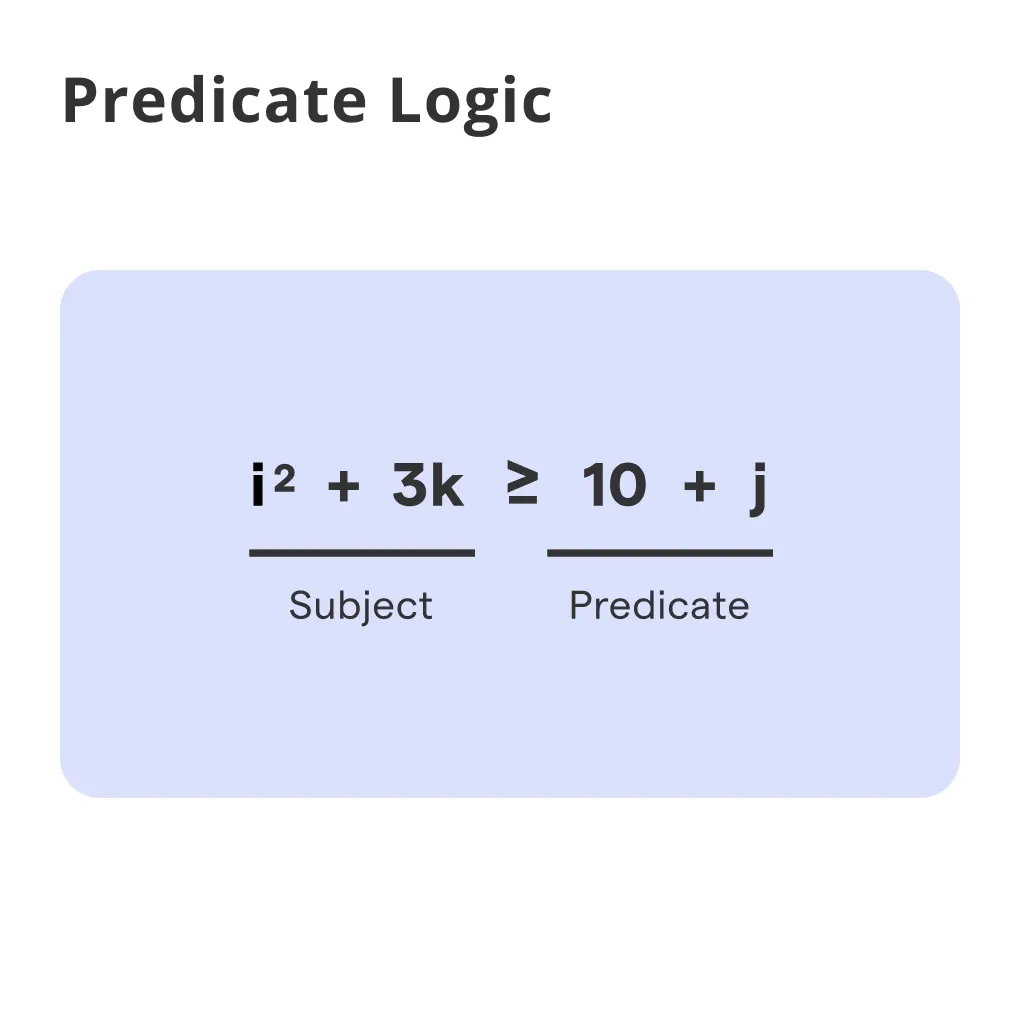What is Predicate Logic?
Predicate Logic, also known as Predicate Calculus, is a foundational system of logic in mathematics and computer science that commonly extends propositional logic.
It employs variables that can be quantified and considers predicates that describe properties or relations.
Distinction from Propositional Logic
While propositional logic or Propositional Calculus deals with simple declarative propositions, Predicate Logic delves further into details by dealing with predicates that express the relationship between subjects.
Components of Predicate Logic
Now that we've understood what predicate logic is, let's break down its vital components.
Predicates
These are the main components of predicate logic that describe a property or a relation involving one or more variables or objects. Predicates become propositions when specific values are assigned to their variables.
Quantifiers
Quantifiers are used to specify how many or how much of a given predicate is true for a certain proposition. The two primary types are
- Universal Quantifier, symbolized by ∀, which states that for all instances a proposition is valid.
- Existential Quantifier, symbolized by ∃, which expresses at least one instance the proposition is valid.
Variables
Variables represent the subjects in a proposition. They can take any value and the truth-value of a proposition will depend on the values of these variables.
Constants
Constants are similar to variables in that they too represent propositions. However, unlike variables, they represent specific, fixed values or entities.
Functions
Functions are operators that take a specific number of arguments and return a value. The arguments could be variables, constants, or a combination of both.
Syntax and Semantics of Predicate Logic
Now let's discuss how Predicate Logic is structured and what it interprets for us.

Syntax
The syntax governs the structure of correctly formed expressions in Predicate Logic. It includes rules for forming predicates, functions, variables, etc and how can they be combined.
Semantics
The semantics, in contrast, interpret the meaning behind well-formed expressions. It assigns truth values based on rules, definitions, and models of interpretation.
Scope and Limits of Predicate Logic
Let's discuss where Predicate Logic is effectively applied and its limitations.
Effective Applications
Predicate Logic is a powerful tool in mathematics, computer science, AI, philosophy and linguistics.
It is used in deductive reasoning, knowledge representation in artificial intelligence, database query languages (like SQL), etc.
Limitations
However, predicate logic is undecidable, meaning there isn’t a method that definitively determines if a statement is universally valid.
It's also more complex than propositional logic, and its increased expressive power means increased computation time.
Concepts within Predicate Logic
Let's explore some important concepts within the realm of Predicate Logic.

Universal Generalization (UG)
Universal Generalization refers to the process where the scope of a variable is extended to make it universally quantified.
Existential Generalization (EG)
In contrast, Existential Generalization refers to where a variable in a proposition is replaced by an instance that makes the proposition true.
Universal Instantiation (UI)
Universal Instantiation allows one to introduce a specific instance of a universally quantified variable.
Existential Instantiation (EI)
Existential Instantiation, on the other hand, introduces a new specific entity in a proposition that makes the proposition true under existential quantifier.
Modalities in Predicate Logic
Certain concepts incorporate the notion of modality in Predicate Logic.
Modality
Modality introduces concepts like necessity and possibility into logic. These additional modal operations increase the expressiveness of logic.
Logic of Knowledge
This refers to epistemic logic where knowledge predicates know(φ) can be formed. This forms the basis of reasoning and inference in artificial intelligence.
Logic of Belief
This is a system of doxastic logic involving belief predicates like believe(φ). It's used widely in philosophy, AI, and cognitive science to model belief systems.
Predicate Logic in Computer Science
Let's see how Predicate Logic leaves its mark in the field of Computer Science.

Programming languages
Systems like Prolog use modifications of predicate logic to create a logical programming language. Predicate Logic is also used in functional programming languages.
Databases
In Databases, the SQL query language involves predicates for filtering and data retrieval tasks.
Artificial Intelligence
Predicate Logic is central to knowledge representation, inference and expert systems in Artificial Intelligence.
Frequently Asked Questions (FAQs)
How does Predicate Logic enhance the expressiveness of Propositional Logic?
Predicate logic introduces quantifiers and variables, which allow for the expression of sentences about multiple entities, not just fixed truths or falsehoods.
Can Predicate Logic be used to represent Knowledge in AI?
Yes, it's a fundamental tool for representing and manipulating declarative knowledge in artificial intelligence systems.
What is the Role of Quantifiers in Predicate Logic?
Quantifiers like 'forall' and 'exists' allow predicate logic to express propositions involving all members or some members of a domain, respectively.
How do you interpret universal quantification in predicate logic?
Universal quantification in predicate logic asserts that the predicates within its scope are true for every element of the specified domain.
In Predicate Logic, How is a Counterexample Used?
A counterexample demonstrates the falsity of a universally quantified statement by showing a single instance where the statement doesn't hold.

